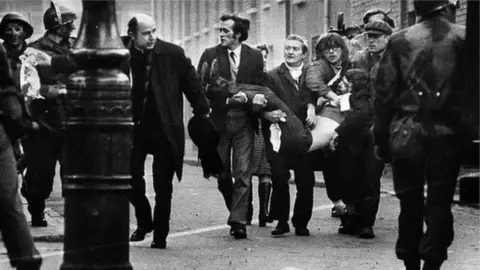Bloody Sunday: Compensation claims 'should be resolved in days'
 BBC
BBCA solicitor representing some of the families of those killed or wounded on Bloody Sunday has said he hopes compensation claims can be resolved within days.
Michael Quinn was awarded £193,000 at the High Court in Belfast on Thursday.
He was 17 when his cheekbone was shattered when he was shot in the face by a soldier on Bloody Sunday.
Thirteen people died after soldiers opened fire in Londonderry in January 1972. A 14th person died later.
About 10,000 people gathered in the Creggan area of Derry on the morning of Sunday 30 January 1972 to take part in a civil rights march.
After prolonged skirmishes between groups of local youths and the Army, paratroopers moved in to make arrests.
During this operation, they opened fire on the crowd.
'Relief'
Mr Justice McAlinden said on Thursday that Mr Quinn's compensation was granted for the "pain and suffering" he has endured over the years.
Mr Quinn also suffered nerve damage to his lip and eyelid.
Ferghal Shiels, the solicitor representing Mr Quinn, told BBC Radio Foyle: "It's been a very difficult experience. Mr Quinn has never spoken publicly about what happened him.
"He was subject to cross examination by a counsel through the Ministry of Defence, as was his wife.
"Mr Quinn is relieved that proceedings are at an end. Financial compensation will never relieve him of the physical and mental scars that he carries with him every day."

Mr Shiels said the cases of Gerry McKinney and Michael McDaid, which were listed for hearing this week, have been adjourned until next week.
He said: "We hope that Mr Quinn's judgement will act as a catalyst to provoke some meaningful negotiations aimed at getting a sensible resolution.
"In the absence of any willingness to properly settle the cases then we would have no alternative but to list each case for trial. We would have no hesitation in doing so.
"I hope there will be a quick and sensible resolution over the next few days."
Public apology
There have been a number of investigations into the deaths, including the Widgery Tribunal - which was later described by some as a whitewash.
In 2010, the Saville Inquiry found that those killed or injured on Bloody Sunday were innocent.
The then prime minister, David Cameron, issued a public apology for the actions of the soldiers, describing the killings as "unjustified and unjustifiable".
Claims were later brought against the Ministry of Defence by those bereaved or wounded.
With liability accepted, three test cases were selected for arguments on the level of damages.